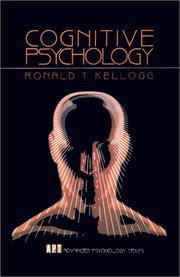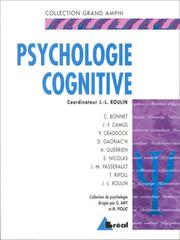| Listing 1 - 10 of 6974 | << page >> |
Sort by
|
Book
ISBN: 9780077122669 0077122666 Year: 2014 Publisher: London McGraw-Hill
Abstract | Keywords | Export | Availability | Bookmark
 Loading...
Loading...Choose an application
- Reference Manager
- EndNote
- RefWorks (Direct export to RefWorks)
Based on a multidisciplinary approach, the book encourages students to make the connections between cognition, cognitive neuroscience and behaviour. The book provides an up-to-date, accessible introduction to the subject, showing students the relevance of cognitive psychology through a range of examples, applications and international research. Recent work from neuroscience is integrated throughout the book, and coverage is given to rapidly-developing topics, such as emotion and cognition.

ISBN: 0803953291 9780803953291 Year: 1995 Publisher: London: Sage,
Abstract | Keywords | Export | Availability | Bookmark
 Loading...
Loading...Choose an application
- Reference Manager
- EndNote
- RefWorks (Direct export to RefWorks)
Book
Year: 2016 Publisher: Cham : Springer International Publishing : Imprint: Springer,
Abstract | Keywords | Export | Availability | Bookmark
 Loading...
Loading...Choose an application
- Reference Manager
- EndNote
- RefWorks (Direct export to RefWorks)
This book offers a comprehensive overview of the purpose of history for psychology. Its purpose is to ask why history should be of concern to psychologists in teaching and research, and in theory and in practice. The future position of humanities subjects is currently highly debated on all fronts. Chapters focus on the arguments from psychologists, upgrade the precision and quality of discussion, and thus, provide a base for affirming the place of history of psychology in the broad field of psychological activity. A fundamental question dominates the discussion. Is the purpose of the history of psychology to serve current psychology, rather than to contribute to historical knowledge – and to enter large debates about what historical knowledge means for being human? If the answer is yes, as most psychologists who come to the issues will presume, in what ways? Are these ways philosophically grounded, or do the social and political conditions of power and funding in universities dominate the arguments? In this volume, the contributors demonstrate the relation between historical investigations and current practice. Featured topics include: The history of psychology and its relation to feminism. The history of psychology and its relation to current research assessment and curriculum. The history of science and its relation to psychology. The metalanguage for psychology. Case studies of history in theory construction. Centrality of History for Theory Construction in Psychology will be of interest to psychologists, professors, graduate psychology students, and scholars in the human sciences.
Book
ISBN: 9031383104 Year: 2011 Publisher: Houten : Bohn Stafleu van Loghum : Imprint: Bohn Stafleu van Loghum,
Abstract | Keywords | Export | Availability | Bookmark
 Loading...
Loading...Choose an application
- Reference Manager
- EndNote
- RefWorks (Direct export to RefWorks)
Cognitieve therapie is een effectieve behandeling gebleken voor vele psychische stoornissen. Dit boek, dat het afgelopen decennium zijn sporen verdiend heeft, geeft een geheel geactualiseerd overzicht van de cognitieve behandeling van psychische problemen.In dit boek ligt de nadruk op de praktische toepassing. De beschreven interventies worden uitvoerig geïllustreerd aan de hand van gevalsbeschrijvingen en letterlijk weergegeven fragmenten. Het boek bevat veel praktisch materiaal dat tijdens de therapie gebruikt kan worden. Bijvoorbeeld dagboekformulieren en gedetailleerd uitgewerkte uitdaagtechnieken.Dit boek is bedoeld voor psychologen, pedagogen en psychiaters en voor hen die hiervoor in opleiding zijn.
Book
Year: 2016 Publisher: Cham : Springer International Publishing : Imprint: Springer,
Abstract | Keywords | Export | Availability | Bookmark
 Loading...
Loading...Choose an application
- Reference Manager
- EndNote
- RefWorks (Direct export to RefWorks)
This book offers a comprehensive overview of the purpose of history for psychology. Its purpose is to ask why history should be of concern to psychologists in teaching and research, and in theory and in practice. The future position of humanities subjects is currently highly debated on all fronts. Chapters focus on the arguments from psychologists, upgrade the precision and quality of discussion, and thus, provide a base for affirming the place of history of psychology in the broad field of psychological activity. A fundamental question dominates the discussion. Is the purpose of the history of psychology to serve current psychology, rather than to contribute to historical knowledge – and to enter large debates about what historical knowledge means for being human? If the answer is yes, as most psychologists who come to the issues will presume, in what ways? Are these ways philosophically grounded, or do the social and political conditions of power and funding in universities dominate the arguments? In this volume, the contributors demonstrate the relation between historical investigations and current practice. Featured topics include: The history of psychology and its relation to feminism. The history of psychology and its relation to current research assessment and curriculum. The history of science and its relation to psychology. The metalanguage for psychology. Case studies of history in theory construction. Centrality of History for Theory Construction in Psychology will be of interest to psychologists, professors, graduate psychology students, and scholars in the human sciences.
Book
ISBN: 9783648176467 3648176463 Year: 2024 Publisher: München : Haufe : Imprint: Haufe,
Abstract | Keywords | Export | Availability | Bookmark
 Loading...
Loading...Choose an application
- Reference Manager
- EndNote
- RefWorks (Direct export to RefWorks)
Jeder von uns möchte herausfordernde Situationen meistern, ohne entmutigt oder gestresst zu werden. Und natürlich ohne als selbstgefällig oder arrogant rüberzukommen. Wie können wir also authentisches Selbstvertrauen entwickeln, ohne zu verschrecken oder uns zu verstellen? Viv Groskop bietet mit der Happy-High-Status-Methode eine neue Perspektive auf unser Selbstvertrauen und unsere Beziehung zu uns selbst. Basierend auf Forschungsergebnissen und inspiriert von der Welt der Comedy, des Films, des Fernsehens, der Politik und des Sports zeigt sie, wie jeder diese neue Form des Selbstvertrauens nutzen kann, ohne als selbstverliebt zu gelten. Die Happy-High-Status-Methode verleiht beruflichen Interaktionen Kraft und Energie und hilft, authentisch zu sein, Selbstzweifel zu minimieren und mühelos durchs Leben zu gehen. Der Bestseller aus Großbritannien erstmals auf deutsch!
Book
Year: 2016 Publisher: Cham : Springer International Publishing : Imprint: Springer,
Abstract | Keywords | Export | Availability | Bookmark
 Loading...
Loading...Choose an application
- Reference Manager
- EndNote
- RefWorks (Direct export to RefWorks)
This book offers a comprehensive overview of the purpose of history for psychology. Its purpose is to ask why history should be of concern to psychologists in teaching and research, and in theory and in practice. The future position of humanities subjects is currently highly debated on all fronts. Chapters focus on the arguments from psychologists, upgrade the precision and quality of discussion, and thus, provide a base for affirming the place of history of psychology in the broad field of psychological activity. A fundamental question dominates the discussion. Is the purpose of the history of psychology to serve current psychology, rather than to contribute to historical knowledge – and to enter large debates about what historical knowledge means for being human? If the answer is yes, as most psychologists who come to the issues will presume, in what ways? Are these ways philosophically grounded, or do the social and political conditions of power and funding in universities dominate the arguments? In this volume, the contributors demonstrate the relation between historical investigations and current practice. Featured topics include: The history of psychology and its relation to feminism. The history of psychology and its relation to current research assessment and curriculum. The history of science and its relation to psychology. The metalanguage for psychology. Case studies of history in theory construction. Centrality of History for Theory Construction in Psychology will be of interest to psychologists, professors, graduate psychology students, and scholars in the human sciences.
Book
ISBN: 9054870168 Year: 1992 Publisher: Brussel VUBPress
Abstract | Keywords | Export | Availability | Bookmark
 Loading...
Loading...Choose an application
- Reference Manager
- EndNote
- RefWorks (Direct export to RefWorks)

ISBN: 2200014554 9782200014551 Year: 1997 Volume: 317 Publisher: Paris Colin
Abstract | Keywords | Export | Availability | Bookmark
 Loading...
Loading...Choose an application
- Reference Manager
- EndNote
- RefWorks (Direct export to RefWorks)

ISBN: 2842911059 Year: 1998 Publisher: Paris Bréal
Abstract | Keywords | Export | Availability | Bookmark
 Loading...
Loading...Choose an application
- Reference Manager
- EndNote
- RefWorks (Direct export to RefWorks)
| Listing 1 - 10 of 6974 | << page >> |
Sort by
|

 Search
Search Feedback
Feedback About UniCat
About UniCat  Help
Help News
News